|
|
|
Sort Order |
|
|
|
Items / Page
|
|
|
|
|
|
|
| Srl | Item |
| 1 |
ID:
124453
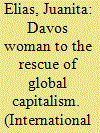

|
|
|
|
|
| Publication |
2013.
|
| Summary/Abstract |
The World Economic Forum (WEF) is a global governance actor that has in recent years taken an increased interest in issues pertaining to gender equality and women's empowerment. The paper critically investigates the work of the WEF in this area, suggesting that WEF-produced gender and development discourse is profoundly compatible with the politics and practices of neoliberalism-not least in the way in which it aligns gender equality and women's empowerment with national economic competitiveness. This is, furthermore, a distinctly postfeminist reading of gender that rests upon the production of neoliberal-compatible female subjectivities-such as "rational economic woman" or "Davos woman"-who emerge as those in society best able to deliver fair and sustainable economic growth (effectively rescuing global capitalism from the excesses of hypermasculine crisis capitalism). The framing of the case for gender equality and women's empowerment in these terms is powerful and may well be an effective way for gender advocates to present their demands. But by analyzing not only how the WEF has framed/represented gender issues but also what has been left out of this representation, the paper points to the way in which simplistic representations concerning the contribution that women make to economic competitiveness disguise the double burdens and gendered structures of socioeconomic inequality that are central to the widening and deepening of the market into all spheres of social life under conditions of roll-back neoliberalism.
|
|
|
|
|
|
|
|
|
|
|
|
|
|
|
|
| 2 |
ID:
164975
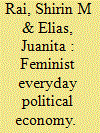

|
|
|
|
|
| Summary/Abstract |
It goes without saying that feminist International Political Economy (IPE) is concerned in one way or another with the everyday – conceptualised as both a site of political struggle and a site within which social relations are (re)produced and governed. Given the longstanding grounding of feminist research in everyday gendered experiences, many would ask: Why do we need an explicit feminist theorisation of the everyday? After all, notions of everyday life and everyday political struggle infuse feminist analysis. This article seeks to interrogate the concept of the everyday – questioning prevalent understandings of the everyday and asking whether there is analytical and conceptual utility to be gained in articulating a specifically feminist understanding of it. We argue that a feminist political economy of the everyday can be developed in ways that push theorisations of social reproduction in new directions. We suggest that one way to do this is through the recognition that social reproduction is the everyday alongside a three-part theorisation of space, time, and violence (STV). It is an approach that we feel can play an important role in keeping IPE honest – that is, one that recognises how important gendered structures of everyday power and agency are to the conduct of everyday life within global capitalism.
|
|
|
|
|
|
|
|
|
|
|
|
|
|
|
|
| 3 |
ID:
094021
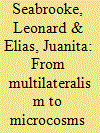

|
|
|
|
|
| Publication |
2010.
|
| Summary/Abstract |
In recent years there has been a great deal of discussion about traditions in international political economy (IPE) scholarship.1 A number of essays and books have been produced that ponder how American IPE scholarship differs from British IPE scholarship, kicked off by Jerry Cohen's (2008a) intellectual history of the field. Journals such as the Review of International Political Economy and New Political Economy have spent significant amounts of time debating these issues. Conference panels have been formed, workshops organised, and essays prizes announced. Understandably, Australian IPE scholars have been keen to put forward their views on how Australian and Australia-based scholars fit within these traditions or schools of thought.
|
|
|
|
|
|
|
|
|
|
|
|
|
|
|
|
| 4 |
ID:
108705
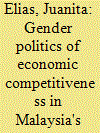

|
|
|
|
|
| Publication |
2011.
|
| Summary/Abstract |
Many academic commentators have pointed to how the widening and deepening of a neoliberal reform agenda in Southeast Asia has brought about the end of developmental forms of state governance and the emergence of less directly market interventionist states pursuing economic 'competitiveness'. In this paper, I note how notions of competitiveness are increasingly fused with ideas regarding the contribution of gender equity and women's empowerment to national economic success. However, drawing upon a case study of Malaysia, this paper highlights how government policies stressing both the marketisation of social reproduction and the need to expand women's productive roles are constantly brought into tension with embedded social structures. Such an emphasis is essential to any understanding of the role of the Malaysian state in economic development - a role that has been fundamentally shaped by a localised politics of ethnicity. The paper draws upon examples from government policy-making that conceptualise women as key workers in the emerging knowledge-driven economy and as microentrepreneurs driving pro-poor economic growth and illustrates how such policies are brought into tension with traditionalist discourses concerning the appropriate role of women in society.
|
|
|
|
|
|
|
|
|
|
|
|
|
|
|
|
| 5 |
ID:
094028
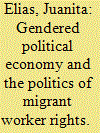

|
|
|
|
|
| Publication |
2010.
|
| Summary/Abstract |
Focusing on the South-East Asian region and looking specifically at activism around the position of migrant domestic workers in the region, this article seeks to evaluate why migrant activist organisations appear to have had, at best, modest influence on gendering the International Labour Organization's approach to labour rights. The author argues that this is largely due to how dominant understandings of labour rights have neglected the significance of social relations of reproduction (i.e. those 'care-related' activities associated with the household) to the functioning of the labour market. Furthermore, a transnationalisation of social relations of reproduction is manifested in the increased feminisation of labour migration in the region and this highlights further problems with dominant labour rights perspectives that remain largely state-centric in their approach. The significance of South-East Asian states in promoting localised regimes of citizenship/immigration and industrial relations greatly limits the ability of activist groups to claim and utilise the language of human rights. Nonetheless, the article argues that a concern with the human rights of female migrants can potentially destabilise dominant understandings of labour and human rights. More generally, the article seeks to demonstrate the insights that a critical feminist human rights approach can bring to studies of work and employment within international political economy.
|
|
|
|
|
|
|
|
|
|
|
|
|
|
|
|
| 6 |
ID:
087021
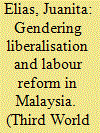

|
|
|
|
|
| Publication |
2009.
|
| Summary/Abstract |
This paper seeks to examine how and why gender needs to be brought into the analysis of state developmentalism in Asia. In doing so, the paper focuses on ongoing processes of labour market and industrial relations reform that have accompanied Malaysia's economic development since the early 1970s. Understanding these reforms from a gender perspective means that we must recognise both the significant contribution that women make to the growth of export manufacturing industries and the role that social relations of reproduction play in underpinning economic reform and transformation. The analysis explores how gendered social relations (of production and reproduction) have been central to the labour politics of Malaysia's state-led developmentalism and how ideas of maintaining 'competitiveness' through the attempts to transition to a more knowledge-centred economy have entailed particular roles and responsibilities for women. Attempts to maintain economic competitiveness in Malaysia have rested upon ideas concerning the need to integrate women more fully into the formal labour market and a greater recognition of the contribution of social relations of reproduction to capitalist accumulation. The article discusses some of the tensions and contradictions that have emanated from this policy shift.
|
|
|
|
|
|
|
|
|
|
|
|
|
|
|
|
| 7 |
ID:
169784
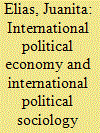

|
|
|
|
|
| Summary/Abstract |
Feminist International Political Economy (IPE), with its focus on the gendered dimensions of social reproduction and market life, provides ground for fruitful engagements between IPE and IPS. Indeed, from this perspective, the boundaries between IPE and IPS are much more porous than assumed in some other contributions to this forum. Pushing against the boundaries of narrowly demarcated disciplinary divides is something that feminist political economists have been actively engaged in since the early days. Our approach is one in which we call for a simultaneous recognition of both the ‘International’ and the ‘Everyday’ in research agendas, speaking as much to new research directions in the field of IPE as to writings in IPS. To illustrate our claim, this short piece reflects on a recent research project into the gendered everyday political economy of housing resettlement schemes in Jakarta, Indonesia – pointing to the interrelationships between everyday gendered practices of work, finance and caring, and how these relationships come to be transformed within the context of the global city. Such an intervention, we hope, points to the significant insights that a feminist lens brings to the development of an ever more sociologically informed international studies.
|
|
|
|
|
|
|
|
|
|
|
|
|
|
|
|
| 8 |
ID:
078399
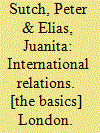

|
|
|
|
|
| Publication |
London, Routledge, 2007.
|
| Description |
ix, 214p.
|
| Standard Number |
9780415311854
|
|
|
|
|
|
|
|
|
|
|
|
Copies: C:1/I:0,R:0,Q:0
Circulation
| Accession# | Call# | Current Location | Status | Policy | Location |
| 052542 | 327/SUT 052542 | Main | On Shelf | General | |
|
|
|
|
| 9 |
ID:
164710


|
|
|
|
|
| Summary/Abstract |
The production and contestation of exemplary centres in Southeast Asia
|
|
|
|
|
|
|
|
|
|
|
|
|
|
|
|
| 10 |
ID:
164716


|
|
|
|
|
| Summary/Abstract |
The dispossession of urban communities across class and racial lines is a global phenomenon linked to the expansion of international investment in the development of ‘exemplary’ city space. However, city evictions are also historically informed and gendered processes which are continuous with past colonial and postcolonial urban rationalisation projects. Drawing on testimonies of women evictees in Jakarta, as well as interviews with public housing managers, this article details the gendered nature of the rationalisation of urban life in the context of a contemporary evictions regime. We argue that the rationalisation of urban space serves to sharpen the gender order by placing material constraints on women's roles, limiting their economic activities and defining them as hygiene‐responsible housewives. Further, and in turn, the limited provision of ‘rusunawa’ public housing, which we show to be a gendered spatial and social transition informed by state doctrine on the family, provides the state with justification for dispossession itself. Finally, women's everyday acts of refusal and resistance show not only that kampung forms of social life continue to be preserved in Jakarta, but also that rationalisation itself is a negotiated and contingent process.
|
|
|
|
|
|
|
|
|
|
|
|
|
|
|
|
|
|
|
|
|